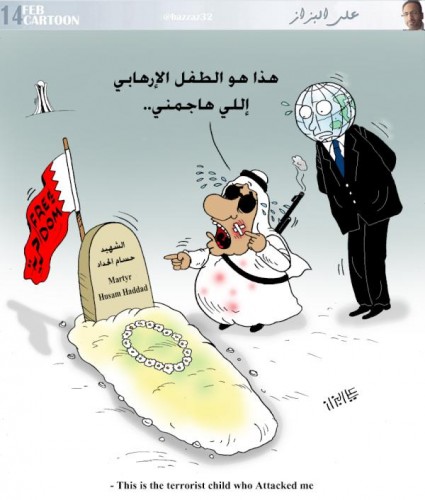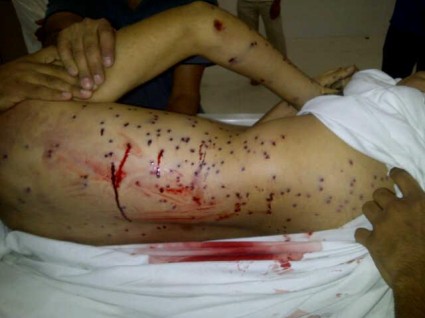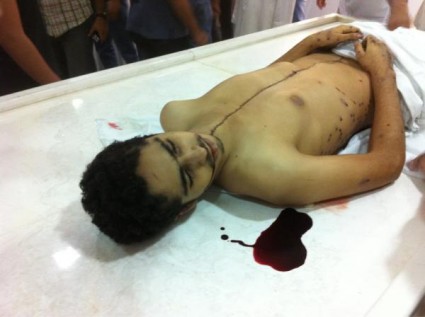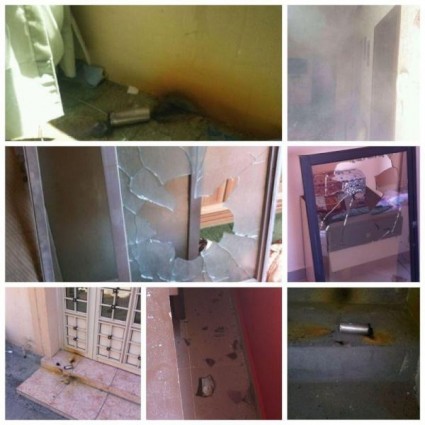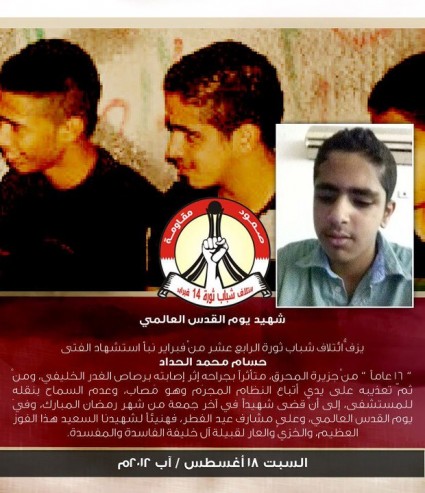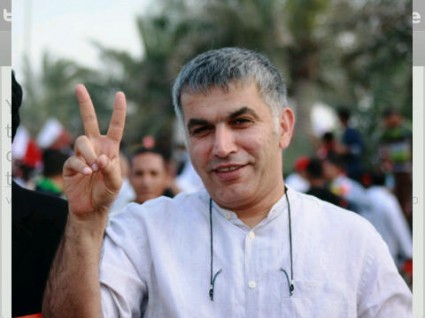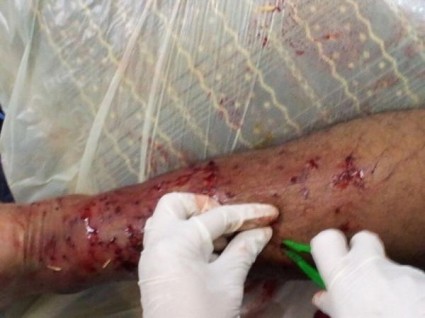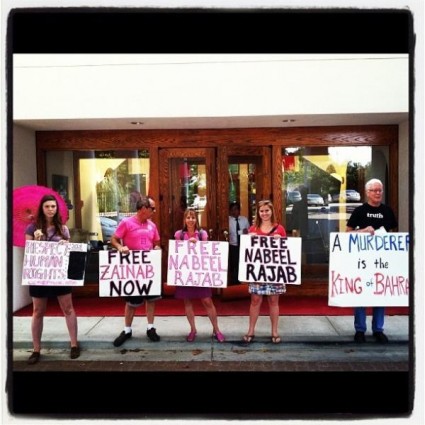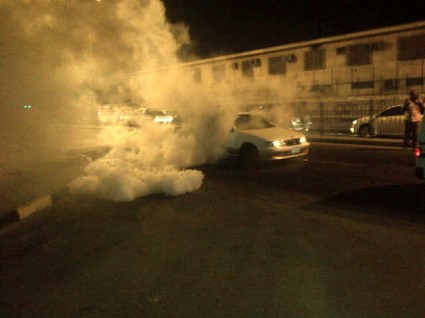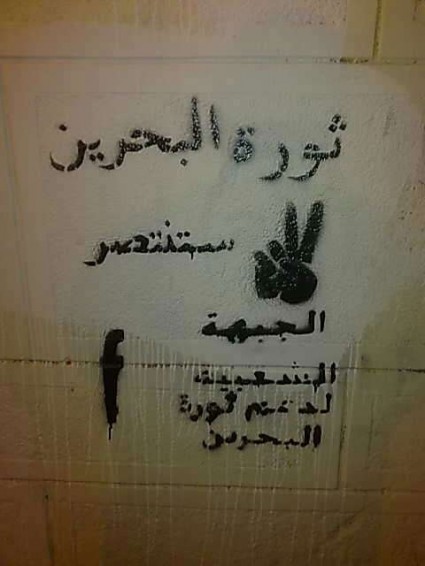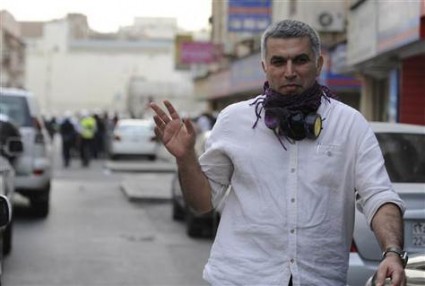Urgent Appeal to ICRC for Immediate Action on Safety and Protection of Nabeel Rajab
European-Bahraini Organization for Human Rights
19 August, 2012
Urgent appeal: to the United Nations and the Red Cross: The leader of the human rights movement Nabeel Rajab is put in solitary confinement facing humanitarian persecution, and his imprisonment is a setback in the history of human rights defenders.
(Bern – Switzerland 21.08.2012): We the European- Bahraini Organziation for Human Right appeal to the United Nations and the International Red Cross for urgent intervention and immediate action to demand the release of human rights defender and the president of the Bahrain Center for Human Rights, Mr. Nabeel Rajab, who was arrested solely for exercising the right to freedom of opinion and peaceful expression, whether online or through demonstrations calling for democracy and justice in Bahrain. We also urge the United Nations Council for Human Rights, the European Parliament, and all concerned governments, to exert their influence on the Bahraini authorities to stop human rights violations and get Mr. Rajab out of solitary confinement.
The moment of Mr. Nabeel Rajab’s arrest from home
Human rights defender Mr. Nabeel Rajab was subjected to violations of his civil and humanitarian rights as a citizen and defender of human rights starting with a media campaign to tarnish his work and discredit him the official media in Bahrain, as well as harassing, arresting, and beating members of the center he heads. He was violently arrested from his home during the period of Emergency Law “national safety” in March 2011, and was tortured for hours at an unknown location, threatened and then released. That was followed by directly targeting him physically in marches for democracy through beatings, arbitrary arrests, and morally through defamation and falsification of the facts, and later unfair trials sentencing him to three years in prison on the date of 08.16.2012 to suffer from abuse and persecution in prison, shocking the international community and human rights organizations. International organizations repeatedly called on the Bahraini authorities to release him with no response to these claims, which have become of no matter and importance to the Bahraini government. Nabeel Rajab’s family wrote an open letter to the U.S. and British governments and all governments that have influence in Bahrain and the United Nations and all human rights organizations, regional and international.
Mr.Nabeel Rajab with his wife Mrs.Sumayah Rajab
Mrs. Sumayah Rajab, the wife of Mr. Nabeel Rajab told the European-Bahraini Organization for Human Rights about her husband’s circumstances in prison saying: My husband Nabeel Rajab called and was cautious in his words, he could not talk about his situation in prison, and when I asked him: Are you in solitary confinement he said: yes. She added that Nabeel Rajab said he was just taken out of solitary confinement and newspapers were prevented from him, then the call with Nabeel suddenly dropped and lasted less than two minutes. …more
August 21, 2012 No Comments
Bahrainis hold anti-regime rallies in Sitra, Nuwaidrat
Bahrainis hold anti-regime rallies in Sitra, Nuwaidrat
21 August, 2012 – PressTV
Bahraini anti-regime protesters have taken to the streets in the island of Sitra and the Nuwaidrat village in the country’s northwest, despite heavy-handed crackdown by Saudi-backed forces.
The recent protests were held days after 16-year-old teenager Husam al-Haddad was beaten to death by Bahraini Interior Ministry personnel in the city of Muharraq, northwest of Manama, on August 17.
Several anti-regime protests were held across the country to condemn the killing.
Bahraini protesters have been holding demonstrations against the ruling Al Khalifa family since February 2011 and they hold King Hamad bin Isa Al Khalifa responsible for the deaths of demonstrators during the uprising.
Scores of people have been killed and many others injured in the Saudi-backed crackdown on the peaceful protests.
Bahrain hosts the US Navy Fifth Fleet and is among the Persian Gulf countries, such as Kuwait, Oman, Qatar, Saudi Arabia, and the United Arab Emirates, that receive military equipment from the United States.
On May 11, the US State Department said Washington will resume sales of military equipment to Bahrain.
August 21, 2012 No Comments
Bahrain: ICRC begins visits to detainees
Bahrain: ICRC begins visits to detainees
2 February, 2012 – Interview
In connection with the violence that erupted in Bahrain a year ago, resulting in numerous arrests, the ICRC has started visiting detainees in the country. Gerard Peytrignet, head of the ICRC regional delegation in Kuwait, explains.
What is the aim of the ICRC’s visits to detainees in Bahrain?
The main objective of our visits to detainees – whether in Bahrain or elsewhere in the world – is to monitor their conditions of detention and their treatment and bring about improvements where necessary. It is important to recall that people arrested and detained must at all times be treated humanely and held in decent conditions. We check whether they have access to basic necessities such as food, sanitation, health care, contact with family members, etc.
Another important focus of our visits is to monitor the treatment the detainees receive, from the moment of arrest and throughout the entire period of their detention – including during the interrogation period and pre-trial detention.
Detainees who have not been able to contact their families will be given the opportunity to send messages to them. This is of course done in full transparency: the detaining authorities check the messages, which are allowed to contain nothing but family news.
Why have the visits begun only now, almost one year after the civil unrest erupted?
We have been engaged in dialogue with the authorities in Bahrain for several months. The dialogue resulted in the signing of a memorandum of understanding with the interior ministry in December 2011. On this basis, we started to visit detainees in the second half of January. The ICRC had already visited places of detention in Bahrain between 1996 and 2001.
Which are the detention places the ICRC has access to? And which detainees do you have access to?
We are currently visiting Jaw prison in Manama, the main detention facility in the country. The visits are being carried out by a team of five ICRC delegates, including one physician. Under the agreement with the Bahraini authorities, we have access to all detainees held in connection with the current unrest.
Will detainees trust the ICRC? Will they speak freely to its delegates?
Visiting detainees, anywhere in the world, is a challenge. Our overall aim is to ensure that detainees are treated humanely and held in satisfactory conditions. There are standard conditions for carrying out visits to detainees. In order to get an independent and accurate picture, we need to be able to tour the premises, to repeat visits as often as necessary, to have dialogue with the detaining authorities, and to talk freely with the detainees of our choice, in private.
Private talks with detainees are central to assessing detention conditions and treatment. But they are also a way of bringing some humanity to places where people are cut off from their families and friends. The personal relationship you have with prisoners is paramount because what you bring as a human being can sometimes already bring some kind of relief. Visits are repeated frequently, in order to enable us to monitor individual cases effectively. This also helps build trust with the detainees we visit.
[Read more →]
August 20, 2012 No Comments
Dead Children Can’t Speak of Their Killers Crime
August 20, 2012 No Comments
President Obama no stranger to the Murder of 16 year olds
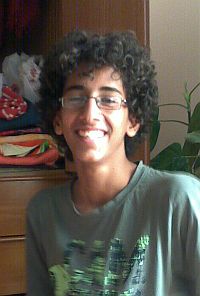
16 yo – Abdulrahman al-Awlaki – U.S. Citizen
American 16-year-old boy — latest victim in Obama’s global drone war
by News Sources, 19 October, 2011 – WarInContext
The Washington Post reports: In the days before a CIA drone strike killed al-Qaeda operative Anwar al-Awlaki last month, his 16-year-old son ran away from the family home in Yemen’s capital of Sanaa to try to find him, relatives say. When he, too, was killed in a U.S. airstrike Friday, the Awlaki family decided to speak out for the first time since the attacks.
“To kill a teenager is just unbelievable, really, and they claim that he is an al-Qaeda militant. It’s nonsense,” said Nasser al-Awlaki, a former Yemeni agriculture minister who was Anwar al-Awlaki’s father and the boy’s grandfather, speaking in a phone interview from Sanaa on Monday. “They want to justify his killing, that’s all.”
The teenager, Abdulrahman al-Awlaki, a U.S. citizen who was born in Denver in 1995, and his 17-year-old Yemeni cousin were killed in a U.S. military strike that left nine people dead in southeastern Yemen.
The young Awlaki was the third American killed in Yemen in as many weeks. Samir Khan, an al-Qaeda propagandist from North Carolina, died alongside Anwar al-Awlaki.
Yemeni officials said the dead from the strike included Ibrahim al-Banna, the Egyptian media chief for al-Qaeda’s Yemeni affiliate, and also a brother of Fahd al-Quso, a senior al-Qaeda operative who was indicted in New York in the 2000 attack on the USS Cole in the port of Aden.
The strike occurred near the town of Azzan, an Islamist stronghold. The Defense Ministry in Yemen described Banna as one of the “most dangerous operatives” in al-Qaeda in the Arabian Peninsula, often referred to by the acronym AQAP.
U.S. officials said they were still assessing the results of the strike Monday evening to determine who was killed. The officials would not discuss the attack in any detail, including who the target was, but typically the CIA and the Pentagon focus on senior figures in al-Qaeda’s affiliate in Yemen.
“We have seen press reports that AQAP senior official Ibrahim al-Banna was killed last Friday in Yemen and that several others, including the son of Anwar al-Awlaki, were with al-Banna at the time,” said Thomas F. Vietor, a spokesman for the National Security Council. “For over the past year, the Department of State has publicly urged U.S. citizens not to travel to Yemen and has encouraged those already in Yemen to leave because of the continuing threat of violence and the presence of terrorist organizations, including AQAP, throughout the country.”
[Read more →]
August 20, 2012 No Comments
No Reform Dialogue with Child Murdering Bastards – al Khalifa Regime Must Go!
August 20, 2012 No Comments
US State Department Allows US Security Firms to Train Bahrain Secuirty to GAS PEOPLE IN THEIR HOMES
U.S.PUBLIC RELATIONS CONSULTANTS KEEP IT HIDDEN-QUIET FOR U.S. PUBLIC AND MAKE IT PALATABLE FOR U.S. CONGRESS
August 20, 2012 No Comments
US State Department, GET A GRIP – US consultants are paid to adivse how to kill 16 year boys with shotguns?
August 20, 2012 No Comments
US State Department – Get A Grip On Reality – It Is Not A CS Gas LESS-THAN-LETHAL Training Video
THIS USE OF CS GAS IN TRAINING
IS NOT THIS
August 20, 2012 No Comments
US State Department Stop Watching Riot Control Training Videos And Get A Grip on Reality
THIS USED FOR RIOT CONTROL AND ‘PERSONAL SAFETY’
DOES NOT DO THIS
RUBBER PELLETS DO NOT DO THIS
August 20, 2012 No Comments
Indiscriminate Reign of Terror by Chemical Gas in Shia Villages
August 20, 2012 No Comments
MOI Chemical Gas Attacks on Homes transform them into lethal Gas Chambers
August 20, 2012 No Comments
MOI Murders 16 Year Old, Hussam Mohammed AlHaddad
Bahrain: Child died after being shot by security forces
August 18th, 2012 – Bahrain Youth Society for Human Rights
Hussam Mohammed AlHaddad-16 years old- died after being shot by security forces in Muharraq.
Two witnesses confirmed to the Bahrain Youth Society for Human Rights (BYSHR) that Hussam was shot using bird shotgun by security forces at 9:30pm ( August 17) and then subjected to severe beatings by 15 (approximately) unknown individuals.
…more
August 17, 2012 No Comments
The Silence Heard Around The World and The Pacification of Bahrain
On 14 August, Nabeel Rajab, one of the outspoken leaders and advocates of non-violent regime-change in Bahrain, as sentenced to three years in prison for organizing and participation in illegal gatherings in Bahrain; i.e, nonviolent protest marches against the bloody regime President Obama and the US State Department continue to refer to as ‘friends’. Rajab is one of a few leaders who have managed to remain free in Bahrain during the last one and half years of the regimes brutal government crackdown on those who have called for regime-change. King Hamad, the ruling Monarch in Bahrain, has banned by decree public gathering without permits, which have been categorically denied to advocates of regime-change since the regime’s bloody crackdown began.
Nabeel Rajab now joins the ranks of dozens of other regime-change leaders, that have been systematically brutalized and arrested on falsified and trumped up charges. Among those similarly arrested and detained, are Sheik AlMahfood(5 year sentence) of the recently banned Amal Society and Human Rights Defender Abdulhadi AlKhawaja(life sentence). AlKhawaja is also colleague of Nabeel Rajab and one of many who Rajab has been working to gain their freedom. Another colleague of Nabeel Rajab’s, Said Yousif Almuhafda, was detained yesterday, 15 August, beaten in front of his two young daughters and later released, in a government act of intimidation and in conjunction with the three-year sentence to prison Nabeel Rajab received.
State Department spokesperson Victoria Nuland said that the US embassy contacted Bahraini authorities to voice concern over the jail term given to Nabeel Rajab for “unauthorized” protests against the Sunni monarchy. “We are deeply troubled by the sentencing,” Nuland told reporters. “We believe that all people have a fundamental freedom to participate in civil acts of peaceful disobedience,” she said [from AFP]. Ms. Nuland subtlety echoes the profoundly incorrect perception of sectarianism in the Bahrain uprising. While sectarian conflict exists, the calls for regime-change come from Sunni and Shiite united in their opposition to the ruling regime. Ms. Nuland’s ignorance and insensitively has been noted along with other State Department belligerence and ignorance, leading to disgraceful diplomacy and conduct from State Department politicals that should know better.
“Sternly worded statements” no matter how lofty, be-it from the United States, the UN or others have become meaningless and fall on the belligerent deaf and disrespectful ears of the Bahrain’s ruling regime. When words critical of the regime are sounded, the regime response is to heap even greater violence and repression on the heads of the anti-regime movement. All the while, the regime claims progress on Human Rights to appease its Western critics. The United States in turn affirms the belligerent conduct of its ‘friends’ with a silence that is heard around the world..
My government (US) needs to move beyond the ‘make nice’ rhetoric coming from what seems to be a broken and inept State Department. The State Department seems deceived by or even worse, complicit in, the flagrant violations of Human Rights that continue with impunity by the ruling regime led by King Hamad. The “middle-road to reform” mind-set that is a hallmark of President Obama’s administration, makes reform in Bahrain “more impossible” with each arrest, prison sentence and drop of blood, the regime sheds. The present course can only end in a bloody wound between the people of Bahrain and the United States that can never be healed. My governments polices are crushing people and fueling anti-US hatred with its support for the al Khalifa Regime. It is disheartening that my government continues to refer to this regime as ‘friends’ and foolishly squanders opportunities to build bridges across the anti-regime divide that Secretary Clinton seems to work so tirelessly to preserve.
One only need look as far as the appointment of Ambassador Krajeski to be skeptical of the State Department role in Bahrain. A pattern reminiscence of CIA Pacification Programs that crush dissent seem to shadow Krajeski – from Indonesia, to Egypt, Iraq, Yemen and now Bahrain. It seems the US has controlled and manipulated its “democracy wars” in MENA to build “US branded democracies” and preserve those regimes that serve its hegemonic interests.
The Bahrain anti-regime movement has become the fly in the ointment, with its clear demand for a pluralist democracy with separation of powers. They are sophisticated, well organized and highly educated and for the time being, they have managed to “pin down” opposition reformist who would preserve the regime. This should be a profound message to the Obama administration but this too seems fall on deaf ears.
The reformists continue to maneuver and flirt with the regime whose pacification program has systematically detained the anti-regime leadership through judicial charades and brought a brutal scourge of rape, murder and torture upon the opposition. All of this under the watchful eye of Krajeski and a team of high dollar US security and public relations firms hired out to the regime to legitimize its tyranny. The question is not whether a revolution is coming to Bahrain but it is a question of when. Moreover, one wonders if the US will find its moral footing in the process. To this end, I labor. Sadly, I doubt the US will find its moral footing and this too will be its undoing in Bahrain… Phlipn – out.

August 17, 2012 No Comments
All The ‘Right-wing Moves’ – Obama works to make Protest illegal in US – lessons from his ‘friends’ in Bahrain
The government says the anti-protest bill was just a small tweak of the existing law. Don’t believe it.
You Can’t Occupy This
By Dahlia Lithwick and Raymond Vasvari – 19 March, 2012
In post-Occupy America, it’s often hard to know whether new citizen protest laws signal the end of free speech or a mere tweak of the machine. That looks to be the case with the new anti-protest bill that passed the House of Representatives overwhelmingly two weeks ago and was signed into law by the president soon thereafter. On its face, the new legislation doesn’t change a whole lot. Yet the Occupy protesters are in an uproar that the bill both targets them and also signals a radical shift in free speech law. Almost nobody else seems to have noticed it at all. Who’s right?
That all depends on what you want to protest and where.
H.R. 347, benignly titled the Federal Restricted Buildings and Grounds Improvement Act, passed the House 399-3. Such a lopsided vote suggests that nobody in Congress is bothered by this, on either side of the aisle. When President Obama signed it on March 8, almost nobody seems to have cared.
Simply put, the way the bill will “improve” public grounds is by moving all those unsightly protesters elsewhere. The law purports to update an old law, Section 1752 of Title 18 of the United States Code, that restricted areas around the president, vice president, or any others under the protection of the Secret Service. The original law was enacted in 1971 and amended in 2006. At first blush, the big change here is that while the old law made it a federal offense to “willfully and knowingly” enter a restricted space, now prosecutors need only show that you did it “knowingly”—that you knew the area was restricted, even if you didn’t know it was illegal to enter the space. This has been characterized in some quarters as a small technical change that hardly warrants an arched eyebrow, much less a protest.
But it’s important to understand what has changed since the original law was enacted in 1971, because it shows how much a tiny tweak to the intent requirement in a statute can impact the free speech of everyone.
For one thing, the law makes it easier for the government to criminalize protest. Period. It is a federal offense, punishable by up to 10 years in prison to protest anywhere the Secret Service might be guarding someone. For another, it’s almost impossible to predict what constitutes “disorderly or disruptive conduct” or what sorts of conduct authorities deem to “impede or disrupt the orderly conduct of Government business or official functions.”
The types of events and individuals warranting Secret Service protection have grown exponentially since the law was enacted in 1971. Today, any occasion that is officially defined as a National Special Security Event calls for Secret Service protection. NSSE’s can include basketball championships, concerts, and the Winter Olympics, which have nothing whatsoever to do with government business, official functions, or improving public grounds. Every Super Bowl since 9/11 has been declared an NSSE.
And that brings us to the real problem with the change to the old protest law. Instead of turning on a designated place, the protest ban turns on what persons and spaces are deemed to warrant Secret Service protection. It’s a perfect circle: The people who believe they are important enough to warrant protest can now shield themselves from protestors. No wonder the Occupy supporters are worried. In the spirit of “free speech zones,” this law creates another space in which protesters are free to be nowhere near the people they are protesting.
Consider that more than 6,700 people have been arrested at Occupy events since last September. Thus, while these changes to the law are not the death of free speech, they aren’t as trivial as the administration would have you believe. Rather, they are part of an incremental and persistent effort by the government to keep demonstrators away from events involving those at the top of the political food chain.
Let’s start by recalling that political speech—of the sort you might direct toward Newt Gingrich or Queen Beatrix of the Netherlands, both of whom merit Secret Service protection—is what the First Amendment most jealously protects. Demonstrators can almost never be muzzled based on what it is they want to say. The First Amendment also has a special solicitude for speech in what are called traditional public fora. There is a presumed right of access to streets, sidewalks, and public parks for the purpose of engaging in political discussion and protest. And while the government can always impose reasonable limits on demonstrations to ensure public order, that power comes with a caveat: It must never be used to throttle unpopular opinion or to discriminate against disfavored speakers. That is a powerful caveat: The degree of slack a court will cut any given restriction on public protest will rest on whether the government appears to be acting even handedly.
Restrictions that apply equally to all subjects and all points of view will usually be approved by the courts if they are narrowly designed to advance a significant governmental interest, such as public safety. But protest restrictions that discriminate based on subject or viewpoint must be absolutely necessary to serve a compelling state interest. Courts rarely permit them. …more
August 16, 2012 No Comments
The Beat Goes On – US Culture and Witness its Conflict
Beat Goes On Lyrics
by Sonny & Cher
The beat goes on, the beat goes on
Drums keep pounding a rhythm to the brain
La de da de de, la de da de da
Charleston was once the rage, uh huh
History has turned the page, uh huh
The mini skirts the current thing, uh huh
Teenybopper is our newborn king, uh huh
The grocery store’s the super mart, uh huh
Little girls still break their hearts, uh huh
And men still keep on marching off to war
Electrically they keep a baseball score
Grandmas sit in chairs and reminisce
Boys keep chasing girls to get a kiss
The cars keep going faster all the time
Bums still cry “hey buddy, have you got a dime”
August 16, 2012 No Comments
Nabeel Rajab – “Jail me three years or 30 – I will never give up.” “I will continue all my life struggling for democracy and human rights.”
Bahraini court sentences human rights activist Nabeel Rajab to three years in prison for illegal protesting
By Gianluca Mezzofiore – 16 August, 2012 – IBTIMES
A Bahraini court has sentenced prominent human rights activist Nabeel Rajab to three years in prison, for three separate cases of inciting and participating in protests against the Sunni Al-Khalifa monarchy.
Rajab’s attorney, Mohammed al-Jishi, told reporters that each of the three cases carried a one-year jail term. Al-Jishi added that his client, currently head of the Bahrain Centre for Human Rights, plans to contest the sentence.
Following the trial, Rajab’s son, Adam Nabeel Rajab, used Twitter to convey a message from his father.
The message read: “Jail me three years or 30 – I will never give up.”
Series of punishments
The three-year sentence is the latest in a series of punishments for Rajab, who heads up Bahrain’s Centre for Human Rights and has been at the forefront of pro-democracy protests during 16 months of unrest in the Gulf Arab state.
The 48-year-old is already in prison, having received a three-month sentence in June for insulting the Sunni elite on Twitter. Rajab used the microblogging site to claim that residents of the Sunni Muharraq district of Bahrain were supporting prime minister Sheikh Khalifa bin Salman only for financial gain.
Just days before the twitter trial began, Rajab emerged from a one-month prison sentence imposed in early May, when he returned from a protest meeting in Beirut, Lebanon.
He was arrested at Bahrain’s Manama airport on 5 May, after returning from a conference in Beirut, Lebanon.
During the Twitter trial, the activist described his case as “political” and “vindictive”.
In a separate interview, conducted with the international observatory Witness Bahrain, Rajab said: “I believe strongly in peaceful means of struggle. It could take longer time, but has better results.
“I will continue all my life struggling for democracy and human rights.”
August 16, 2012 No Comments
Qatif wounded protesters in urgent need for treatment – Sheikh Tawfiq al-Amer indicted
Saudi Arabia: Qatif wounded protesters in urgent need for treatment & cleric Amer indicted
15 August, 2012 – Silver Lining
Qatif Wounded Protesters In Urgent Need for Treatment
Al Manar – The A-Sharq [East] Center for Human Rights in Saudi Arabia that warned “the wounded peaceful protests in Qatif Eastern province and those who did not review medical centers for fear of their arrest are in real need for urgent medical care.”
In a letter to Doctors Without Borders, the center urged organizations to provide assistance to the wounded protests in Qatif.
They further stressed that ” 20 wounded protests who were shot dead by Saudi security forces fall under the rubric of “disabled” because of the sensitivity and the severity of their injury.”
“As some of the wounded have went to hospitals, others refused to go to hospitals fearing of the arrest in the event they review medical and treatment centers,” the human rights center said.
It further cautioned that “some people still carry bullets in their bodies fired by government forces, and they refuse to risk their lives by either visiting hospitals so that they would be arrested and subjected to torture.”
“On the day of the arrest of Sheikh Nimr Baqir Nimr, about ten thousand demonstrators flooded from the town of al-Awamiya towards the city of Qatif,” the center highlighted and noted that “the police shots led to two martyrs Mohamed al-Fel and Akbar al-Shakhuri.”
” 27 people were injured, including one child, and most of them were treated in home clinics while others were arrested after their visit to the medical centers. “
Saudi officials indict – cleric after year in jail
Saudi Arabian officials have issued an indictment against prominent – cleric Sheikh Tawfiq al-Amer, who has been held in jail for one year without trial.
On Sunday, the authorities issued a list of charges against Sheihk Amer, accusing him of making false statements against the Saudi king, calling for political reform and encouraging people to demand a transformation of the ruling system.
The authorities also accused the cleric of insulting Saudi religious scholars…
Moreover, Sheikh Amer has been also charged with collecting donations, and raising the calls for prayers (Azan) in the Shia way from the mosques at which he used to be the imam.
August 16, 2012 No Comments
Paying the Price for Speaking-out: Three Years of Silence – Interview with Nabeel Rajab before arrest
August 16, 2012 No Comments
Bahrain: Said Yousif Almuhafda – Statement upon release from MOI kidnapping…
Statement from Said Yousif Almuhafda on his detention
By admin – 16 August, 2012 – Bahrain Justice and Development Movement
Said Yousif holds a banner in support of detained Nabeel Rajab
Leading Bahraini human rights activist Said Yousif Almuhafda was yesterday beaten by Bahraini police, infront of his two young daughters, before being detained for 3 hours. It is the latest in a wave of attacks against human rights and opposition activists, with Nabeel Rajab and Zeinab Alkhawaja still behind bars until now.
Said Yousif gave us a full account of his harrowing ordeal from the moment he was stopped by police. He said, “I was driving in the street close to Zayed City when I was stopped by traffic police, in the middle of the highway. I was told that I was wanted after being identified at the checkpoint in A’ali. A police car then arrived (numbered 6054) and 4 officers punched and slapped me infront of my daughters.”
He then describes what happened when another police car (numbered 5415) arrived. “A traffic policeman forcibly took my phone from me, whilst another was inspecting my car. They found a banner with a picture of Nabeel Rajab and asked me who it was. I told them it was Nabeel and they told me to say ‘no this is our whore’. When I refused to speak such language, especially infront of my children, I was punched twice in the head.”
“The worst thing and what hurts me the most was that this took place in front of my daughters”
After this shocking level of abuse a policeman drove his car to a checkpoint “at very high speed”. He said, “I called my wife to pick up my daughters and was then accompanied by force to the central police station. There they took my testimony and confiscated two banners than had been in my car. I was held for 3 hours in total without any access to a lawyer or any warrant being presented for my arrest. Before I was released I was forced to sign a pledge that I would return to the police station when summoned, again without a lawyer.”
“The worst thing and what hurts me the most was that this took place in front of my daughters (5 and 2 years old). They were crying throughout the ordeal and were very scared about what would happen. Children should never be forced to witness such brutality.”
The violent attack and detention of Said Yousif is another worrying reminder of the treatment faced by human rights activists in a country that claims to respect the values of human rights. It raises serious questions over the impunity that police officers act with and the clear lack of concern they have of being brought to justice for consistent harassment. The personal identifying of Said Yousif suggests a high level of official collusion in the attack and is further evidence of the systematic nature of the violence of the Bahraini authorities. The authorities have not issued any statement on the incident. …source
[Excerpted from Twitter following release from MOI kidnapping]
S.Yousif Almuhafda S.Yousif Almuhafda @SAIDYOUSIF
Now I’ll tweet about what happened to me and the way I was arrested tonight #Bahrain.
S.Yousif Almuhafda @SAIDYOUSIF
I was in the street adjacent to the checkpoint near Zayed City when I was stopped by traffic police in the middle of the highway #Bahrain
S.Yousif Almuhafda @SAIDYOUSIF
They said I’m wanted by A’ali checkpoint, when police car numbered 6054 arrived 4 of them beat, punched &slapped me in front of my daughters
S.Yousif Almuhafda @SAIDYOUSIF
Another police car numbered 5415 arrived and a traffic policeman took my phone by force, another was inspecting my car .. CONTD #Bahrain
S.Yousif Almuhafda @SAIDYOUSIF
They found a banner of Nabeel Rajab and asked who’s this? I told them &they said no say this is “our whore” I refused &they punched me twice.
S.Yousif Almuhafda @SAIDYOUSIF
Then a member of mercenaries drove my car with a very high speed to a checkpoint &I called my wife to pick up my 2 little daughters #Bahrain
S.Yousif Almuhafda @SAIDYOUSIF
I was given 2 traffic tickets as a gift for my rights work, one said I know you &I’m not afraid of you! another said we’ll show you #Bahrain
S.Yousif Almuhafda @SAIDYOUSIF
Then drove my car to the central police station where they took my testimony & member of the police station stole 2 banners from me #Bahrain
S.Yousif Almuhafda @SAIDYOUSIF
They made me sign a pledge without the presence of a lawyer to come to the police station in case I was summoned ! #Bahrain
S.Yousif Almuhafda @SAIDYOUSIF
My arrest was arbitrary and without a warrant from public prosecution #Bahrain
August 16, 2012 No Comments
An Interview with Nabeel Rajab “We Will Continue Our Uprising”
Bahrain Feature: Interview with Nabeel Rajab “We Will Continue Our Uprising”
EA World View – Josh Shahryar – 16 August, 2012
Editor’s Note: In January, EA’s Josh Shahryar spoke twice with Nabeel Rajab, the activist heading the Bahrain Center for Human Rights. The first discussion occurred just after police had attacked a march in the capital Manama, with Rajab at the front, and had allegedly beaten the human rights activist.
The second interview followed more marches, more clashes, and more deaths from tear gas and possibly from police abuse. Regime supporters claimed that Rajab and opposition societies such as Al Wefaq suported violence against the security forces, while critics argued that little has changed despite the King’s promise to address the shortcomings identified in November’s report by the Bahrain Independent Commission of Inquiry.
This morning, seven months later, Nabeel Rajab was sentenced to three years in prison for participation in illegal marches. In light of this, we post the full text of the second interview
What is the forthcoming strategy for the opposition, given that 1) the regime is not giving way on demands for substantial political reform; 2) marches are often blocked by security forces; and 3) there are claims of a violent minority growing amongst protesters?
I don’t believe violence is a policy of the opposition or that it is systematic. Lately we have seen some isolated cases of violence. We as human rights groups and the opposition in Bahrain disagree with violence and don’t think it could be the means for change for the better. However, we understand the frustration of the people. They are being arrested, tortured and their loved ones are being killed.
The other side [the regime] is offering no solutions. Due to political considerations and economic interests, the international community is ignoring these abuses as well. That is adding to the feeling of frustration. Then we see people getting killed because of tear gas to which the international community replies with more silence. Foreigners come to Bahrain, they demolish mosques, they rob houses, they destroy property. An indigenous opposition in this country exists that is now being crushed by foreign mercenaries.
I am very sad to see violence, I don’t think it will ever be a solution, but [the human rights groups in Bahrain’s] ability to control or to keep masses peaceful is limited because of the pervasive violence against them by the regime. The same is the case with the opposition — they can’t either. The deadlock and the continued oppression by the government is creating this violence and I’m afraid that this violence could increase in the face of oppression and silence by the international community.
Let’s make one thing clear, all is in the hands of the government. All we can do is create pressure locally and internationally. all the tools are in the hands of the government — the army, police and all institutions. The government doesn’t seem to have the willingness to make changes, especially since it is getting support from regimes like Saudi Arabia, who are helping with oppression to either stop or to hijack the revolution.
So we have to put pressure on those governments, social and economic, to take sides with the people who are being oppressed. Locally, we will continue our uprising. We can’t imagine any reason to stop now. We are at a stage where over 50 people have been killed, thousands have been injured, countless have been tortured. Human rights violations have been committed by many people in system including high-ranking members of the royal family, like two sons of the king. With all these huge sacrifices we have paid, I don’t think anyone is thinking of stopping the uprising. We will continue fighting for justice, democracy and freedom. We will try our best to keep it peaceful and maintain calm.
You mentioned Saudi Arabia. What has been the role of Saudi Arabia in the violence against Bahrain?
Saudi Arabia is working parallel to the revolution to cancel it. Across the Middle East, either, it is either giving money to stop revolutions or when they happen it tries to hijack them. And this is happening in places like Egypt. They have wealth to buy institutions and media to influence the outcome of revolutions. That has to be taken into consideration when people are fighting for democracy in this part of the world since Saudi Arabia is powerful in the Gulf and Middle East.
This is one reason why you don’t hear about Bahrain in the international media because most of the media in this part of the world are owned either by Qatar or the Saudis. These countries are ruled by regimes who are friendly with the government in Bahrain. That’s why Al Jazeera Arabic, which was actively covering all the other revolutions [in the Middle East and North Africa], is totally silent about Bahrain. That is why Al Arabiya continues to run material opposing the Syrian regime, but when it comes to Bahrain, they are on the government’s side. This is the case with all media owned by them [the Saudis].
What does King have to do to stay in power?
The truth is that this king had more support from the people than any other king from his family in the past 200 years because of the promises he made. This support even came from human rights organizations. We had hope.
In 2000, He was in the village of Sitra on a visit. People — civilians — lifted his car up with their hands and carried it around the village out of happiness and love. They shouted, “With our blood and life, we would sacrifice for you.” But that was ten years ago. Now 14 people have been killed in that village in the past few months. Now when they protest, they shout, “King Hamad! Step Down”. People have lost confidence in the king.
There should be a radical change for people to regain their trust in him. There should be a radical move that will bring confidence back. It is gonna have to be much more than what he did in 2000 to gain trust and confidence because people have lost trust in him and the regime. First of all, he must release all political prisoners. Then, he must bring the opposition together and ask their demands with them while treating them with dignity and respect and granting. Then, he must apply and implement all the demands they require. A big part of the opposition still isn’t asking for the overthrow of the government. Calls for his departure are not as deep-rooted. They only started when people started to get killed by security forces. His role may be negotiable.
The bottom line is that there should be real changes to satisfy people. The government has failed completely to address the people’s demand. The king’s image has become that of a man who doesn’t keep his word because of the number of promises he made and never fulfilled them. However, the government doesn’t seem to want to give anything. …more
August 16, 2012 No Comments
Bahrain Victorious
August 16, 2012 No Comments
Bahrain, emboldened by international silence, sentences Nabeel Rajab to 3 years imprisonment
Bahrain, emboldened by international silence, sentences Nabeel Rajab to 3 years imprisonment
Bahrian’s Human Rights Activits, Nabeel Rajab, gives a victory sign during an anti-government protest held in downtown Manama February 11, 2012. REUTERS/Stringer
16 August 2012
“The BCHR and GCHR condemn in the strongest terms the sentence passed today against the detained human rights defender Nabeel Rajab by the Bahraini government on charges related to protesting. Rajab was sentenced to a total of three years imprisonment in three cases, to be immediately carried out.
Nabeel Rajab is the president of the BCHR, the director of the Gulf Center for Human rights, the vice president of FIDH, and on the advisory board for the MENA section in Human Rights Watch. He is a renowned human rights defender, and in 2011 he was awarded with the Ion Ratiu Democracy Award because he “has worked tirelessly and at considerable personal peril to advance the cause of democratic freedoms and the civil rights of Bahraini citizens”.
The GCHR and BCHR believe that the only reason for targeting Rajab is to prevent him from continuing his legitimate and peaceful human rights work.
He is already serving a 3 months imprisonment sentence on charges of “ libeling the citizens of the town of Muharraq over twitter”, another case of an ongoing campaign of judicial harassment…”
To continue reading the statement please go to: http://bahrainrights.hopto.org/en/node/5387
—
Maryam Al-Khawaja
Acting President / Bahrain Center for Human Rights
Head of International Office / Gulf Center for Human Rights
Tlf: +4581757959
August 16, 2012 No Comments
Bahrain Human Rights Defender, Nabeel Rajab sentenced to THREE YEARS for organizing and participating in Peace Protests
Bahrain sentences prominent activist to 3 years prison for instigating, partaking in protest
By Associated Press, 16 August, 2012 Washington Post
MANAMA, Bahrain — A prominent Bahraini human rights activist was found guilty Thursday of instigating and participating in several illegal gatherings and sentenced to three years in jail.
The unexpectedly stiff sentence against Nabeel Rajab will raise questions about the Western-backed Sunni monarchy’s commitment to reform, and embolden anti-government protesters who have been demonstrating the past 18 months for greater rights in the Gulf island kingdom, home to the U.S. Navy’s 5th fleet.
Rajab, who is already serving a three-month sentence for posting anti-government comments on Twitter, was in court for the verdict. He is president of the Bahrain Center for Human Rights.
Rajab’s attorney Mohammed al-Jishi said each of three cases yielded a year imprisonment, for a total of three years. Al-Jishi said he plans to appeal the ruling.
In a separate case involving comments made on social media site Twitter, a judge delayed issuing a verdict against Rajab’s appeal until Aug. 23.
Bahrain has experienced near daily protests since February 2011 following an uprising by the kingdom’s Shiite majority seeking greater political rights from the Western-backed Sunni monarchy. At least 50 people have died in the unrest and hundreds have been detained, including prominent rights activists and Shiite opposition leaders.
Shiites account for about 70 percent of Bahrain’s population of just over half a million people, but claim they face widespread discrimination and lack opportunities granted to the Sunni minority. The country’s leaders have offered some reforms including restoring jobs for many Shiites pushed out from their posts at the start of the uprising and giving parliament more power.
But the opposition says they fall short of Shiite demands for a greater voice in the country’s affairs and an elected government.
The unrest has put Washington into an awkward position. U.S. officials have called for efforts to reopen political dialogue in Bahrain, but are careful not to press too hard against the nation’s leadership and possibly jeopardize its important military ties.
Rights groups criticized the ruling against Rajab and said it raises questions over whether the regime is serious about reforms. They have called for his immediate release.
“It seems Bahrain’s rulers are far more comfortable with harsh repression than with the reforms King Hamad keeps promising,” said Joe Stork, deputy director of Human Rights Watch’s Middle East and North Africa division. “The government has yet to show that Nabeel Rajab did any more than exercise his right to free expression and peaceful assembly. He should be set free, not sent away from his family to prison.” ….source
August 16, 2012 No Comments
Shaking the Rafters – Repression begets rebellion in Saudi Arabia
Repression begets rebellion in Saudi Arabia
By Chris Zambelis – 16 August, 2012 – Asia Time
Against a backdrop of ongoing simmering dissent in the Arab world, growing unrest in Saudi Arabia, in contrast, has gone virtually unnoticed. In a climate of increasing political openness, popular Arab demands for the fall of longtime dictatorships have served as vehicles for airing deeply embedded resentments. In this context, narrow segments of Arab societies that have traditionally been subject to targeted discrimination, including ethnic and religious minorities, have become encouraged to articulate their grievances.
The mobilization of Saudi Arabia’s Shi’a Muslim minority in the kingdom’s Eastern Province (al-Mintaqah al-Sharqiyah) since 2011 and the resulting crackdown by Saudi security forces attests to the fact that the kingdom is not impervious to the kind of unrest being seen in fellow Arab countries.
The fallout from the July 8 arrest of Sheikh Nimr Baqr al-Nimr on charges of sedition by Saudi security forces is demonstrative of the sectarian tensions percolating inside the reclusive Kingdom and the broader geopolitical currents driving Saudi behavior. Al-Nimr, a prominent Shi’a cleric and outspoken critic of the Saudi royal family and the regime’s persecution of its Shi’a citizens, was reportedly shot in the leg during his arrest while driving near his home in the village of al-Awamiyah in Eastern Province.
Al-Nimr, who is regarded as the spiritual leader of Saudi Arabia’s Shi’a community, remains in Saudi custody at a military hospital where, according to members of his family, he has endured torture. Al-Nimr has since gone on a hunger strike to protest his detention. The sheikh’s arrest has sparked protests across Eastern Province, including in Qatif, al-Awamiyah, al-Hasa, and Safwa.
The protesters are demanding justice and equality, the release of all political prisoners, and the initiation of political reforms in the kingdom. Demonstrators have also called for the Saudi royal family to step down. Saudi security forces have used live fire and other repressive tactics to suppress the protests, killing and injuring a number of demonstrators in the process. Scores of protesters have also been detained throughout Eastern Province. The Saudi regime has blockaded major centers of dissent such as Qatif and other locations to collectively punish residents by inhibiting freedom of movement and economic activity .
Al-Nimr’s latest arrest – the sheikh was arrested previously in 2004 and 2006 on similar charges – has emboldened Shi’a activists in Saudi Arabia. Riyadh has scoffed at al-Nimr’s scathing denunciations of the Saudi royal family and demands for greater rights for the Shi’a. For its part, the Saudi regime sees al-Nimr as a dangerous subversive and accuses him of calling for the secession of the Eastern Province. Saudi Arabia also frequently labels al-Nimr as an instrument of an aggressive Iranian foreign policy that aims to undermine unity and stability in the kingdom.
Saudi Arabia’s reaction to dissent among its Shi’a population provides insight into the way it interprets its evolving geopolitical position in a rapidly changing Middle East. In a broad sense, the Saudi regime perceives the popular demands for freedom and democracy being voiced by Arabs as a serious threat to its long-term sustainability. Saudi Arabia also sees an Iranian hand behind Shi’a-led activism in the region. As evidenced by its decision to deploy security forces in neighboring Bahrain in March 2011 to crush an uprising led largely by a marginalized Shi’a majority that is agitating for greater freedoms under a Sunni-led, pro-Saudi monarchy, the kingdom worries that its own Shi’a community will rise up in turn.
Saudi Shi’a, many of whom maintain tribal and familial links with their Bahraini counterparts, organized protests in solidarity with Bahrainis while calling on Riyadh to remove its military from Bahrain. In this regard, Saudi Arabia views the organized and sustained political opposition among its Shi’a community in the context of its regional rivalry with Iran. ….more
August 15, 2012 No Comments

